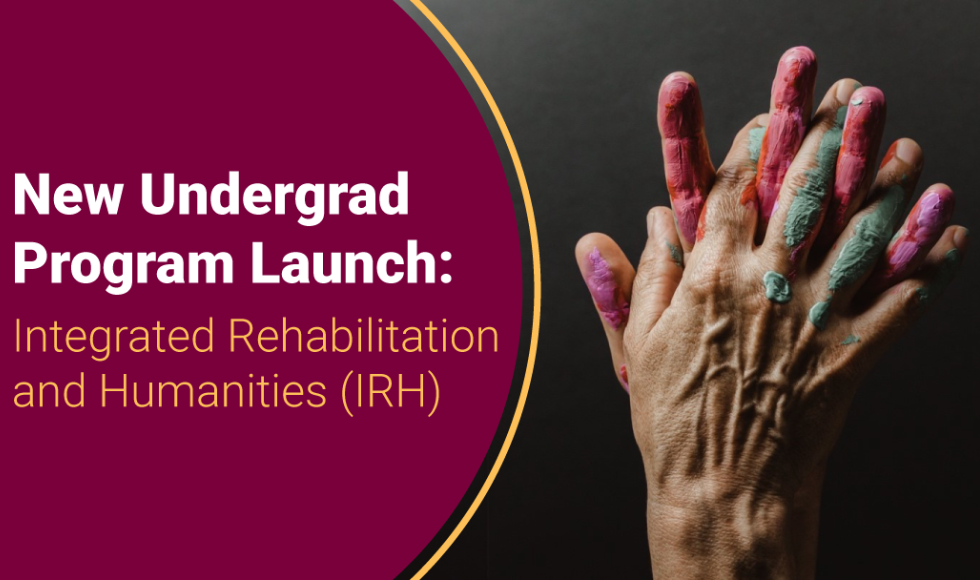New undergraduate program combines humanities and rehabilitation science

The Integrated Rehabilitation and Humanities program, the first of its kind, will launch in September, offering in-class learning followed by a third-year experiential practicum.
A new cross-disciplinary undergraduate program being offered through a unique collaboration between the faculties of Health Sciences and Humanities will accept applications this spring, for its first cohort in September 2024.
The Bachelor of Health Sciences (Honours) Integrated Rehabilitation and Humanities (IRH) program, the first of its kind in the world, will involve a unique blend of coursework that reflects the complex nature of health and well-being while considering what it means to be human at its most fundamental level.
In their third year, students will have the opportunity to apply their in-class learning through an experiential practicum with a variety of community partners.
Under the direction of Brenda Vrkljan, a professor of occupational therapy in the School of Rehabilitation Sciences, the program will graduate professionals who are better able to address the health, social and human needs of individuals and their communities.
“When considering the core philosophy of this program we asked our campus and community partners the deep questions about what exists at the intersection of health, rehabilitation and the humanities,” says Vrkljan, an experienced rehabilitation scientist and an advocate for interdisciplinary learning. “Health is more than biology and biomechanics. It’s about our interaction with the world, our identity, and how we interact with our environment.”
Fundamentally, the IRH program acknowledges the World Health Organization’s emphasis on the social determinants of health — how a person’s cultural background and economic situation can impact everyday life and health trajectories.
The aim is to provide students with a robust understanding of well-being and quality of life.
“We’re preparing students not just for careers but for lifelong learning and growth, as engaged citizens in their community,” Vrkljan notes.
The creative spark
In developing the program, “we were inspired by McMaster’s legacy of educational innovation and the realization that addressing health and well-being could be strengthened by using a combined rehabilitation and humanities lens,” says Pamela Sweet, Dean of the Faculty of Humanities.
The program emphasizes communication, discovery, innovation, and entrepreneurship, says Dina Brooks, associate vice-president, Academic, in the Faculty of Health Sciences.
“These skills are integral to both the arts and the rehabilitation sciences,” Brooks says.
Because of its interdisciplinary nature, graduates of the program can go on to a range of careers.
“What we want our students to recognize is that job titles may evolve, but the essence of rehabilitation, health, and creativity remain,” Vrkljan says.
Unique experiential learning inside and outside the classroom
While the integration of health and humanities is not new, the IRH program distinguishes itself through its focus on rehabilitation, equity and inclusion, Vrjkljan says.
“It’s about making the learning active and engaging so as to appreciate the depth of human experience and understanding.”
Graduates of the program will be seen as changemakers, equipped to identify and seize opportunities for innovation in healthcare and beyond, she says.
Engagement with public and private sector stakeholders has revealed a growing enthusiasm for the unique skill set IRH graduates will bring to the workforce.
“There is a shift taking place in health systems where there is increasing focus on patient-centred care,” says Omar Aboelela, assistant vice-president of partnerships at CBI Health. “With this shift, comes a need for a new type of health care provider who focuses on the human aspects of working in health and social sectors.”
The IRH program addresses this need and fills a major gap in undergraduate education, Aboelela says, by providing graduates with “the communication, teamwork, and human elements from the arts, paired with the health and rehabilitation background to offer a complete patient experience.”
Students will emerge from the IRH program with an enhanced worldview, problem-solving skills, and an enduring curiosity. “The program encourages students to remain open, curious, and committed to lifelong learning,”says Vrkljan.
“It’s an opportunity to address gaps in current coursework that includes experiential and community-engaged learning that will contribute to a brighter future for our students and society.”
Internal applications to the IRH program will open soon and students must apply by April 30, 2024. External applicants must apply by March 30, 2024. To learn more about the applications process, visit the Future Students page of the IRH website.

